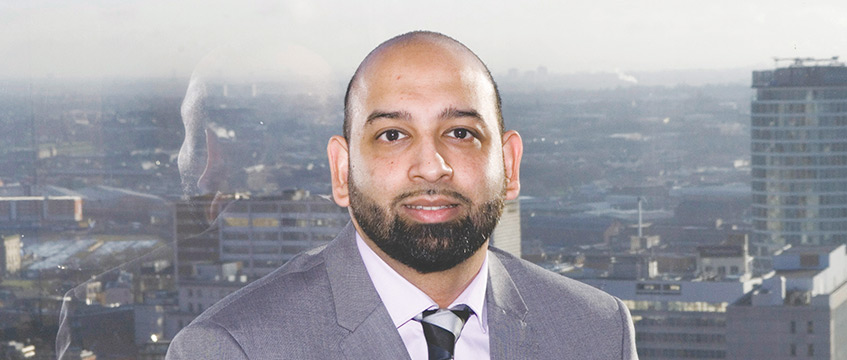Innovation and leadership needed to build houses and lift those most in need
The age of austerity is over, according to Theresa May’s conference speech. But if that era is behind us, what lies ahead? asks Waheed Nazir, corporate director – economy, Birmingham City Council.
I hope the answer is a prolonged period of sustainable growth, with the emphasis firmly on “sustainable”. But if that hope is to be realised, there are two prerequisites. Firstly, that growth must be inclusive, benefitting everyone at all levels of society. Secondly, delivering it will require strong civic and business leadership with a renewed purpose.
If the watchwords of the age of austerity were caution and prudence, the vocabulary of the coming years must centre on innovation, creativity and responsibility. No one can question the fundamental rationale underlying the belt-tightening of recent years; ultimately, as a country, we cannot spend more than we can afford.
The age of austerity is over, according to Theresa May’s conference speech. But if that era is behind us, what lies ahead? asks Waheed Nazir, corporate director – economy, Birmingham City Council.
I hope the answer is a prolonged period of sustainable growth, with the emphasis firmly on “sustainable”. But if that hope is to be realised, there are two prerequisites. Firstly, that growth must be inclusive, benefitting everyone at all levels of society. Secondly, delivering it will require strong civic and business leadership with a renewed purpose.
If the watchwords of the age of austerity were caution and prudence, the vocabulary of the coming years must centre on innovation, creativity and responsibility. No one can question the fundamental rationale underlying the belt-tightening of recent years; ultimately, as a country, we cannot spend more than we can afford.
However, it is also undeniable that all the major social and political issues of recent years have revolved around a sense that opportunity, and therefore prosperity, are not open to all.
From housing and homelessness to regional and intergenerational inequality, zero-hours contracts, the gig economy and the rise of the so-called “precariat”, the common theme has been a perception that the rising economic tide of recent years has not lifted all boats.
Unleashing creativity
And perceptions matter. The lack of faith in business among the general public should concern us all and needs to be addressed. The innovation and creativity that drives forward an economy needs to be unleashed but with a new purpose and sense of responsibility.
Business needs to take centre stage in delivering inclusive growth. It needs to demonstrate that it serves society, rather than society being beholden to the business elite.
The property industry has to lead this change.
That may sound radical to some, but in truth it reflects the heritage of our sector. Our business lies in providing the most basic of human needs: shelter for all, a commitment to improving the quality of life for rich and poor alike. This underpinned the modern discipline of planning as it was developed by the likes of Sir Ebenezer Howard.
To deliver inclusive, sustainable growth, the impact on the most disadvantaged in society has to be the ultimate yardstick for judging the success of any development.
Yet delivering inclusive growth today will require innovation and experimentation, trial and error and iteration. Inevitably, it will involve risk.
For some that will be uncomfortable.
Retrenchment
In the aftermath of the financial crisis and with the onset of austerity, many people in the private sector have retrenched, preserving capital today rather than creating wealth for tomorrow. At the same time, many people in the public sector have prioritised fiscal consolidation over social outcomes.
The culture of our industry has become highly risk averse. If the age of austerity is over, it is time for that culture to change.
But cultural change is hard to deliver. To stand any chance of taking root, it must be championed and demonstrated through good leadership.
The good news is that such inspiring individuals do exist across our sector. Indeed, those who have embraced innovation over the past decade have been the most successful in terms of both commercial and social impact. David Partridge and Camden Council have revitalised one of London’s most historic neighbourhood in King’s Cross. Sir Howard Bernstein and John Whittaker have done amazing work for Manchester at Salford Quays. Tony Pidgley and the team at Greenwich Council are steaming ahead with one of the most comprehensive and ambitious housing regeneration projects in Europe at Kidbrooke Village.
Patient capital
Unfortunately, leaders with the confidence to take on and deliver these transformative projects are currently the exceptions. We need their approach of using patient capital to back a long-term vision delivering inclusive growth to become the norm.
Ten years after the financial crash and six months before we leave the EU, the question of what sort of economy and society we want to live in is urgent. As the guardians of the built environment – the fabric of all local communities – the property industry must engage with these issues.
Now is the time to be bold. To experiment and be radical. To try new ways of working and challenge convention. If austerity is a thing of the past, now more than ever it is up to us to take the lead and be responsible for building a prosperous and inclusive future.











